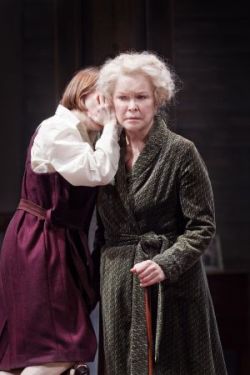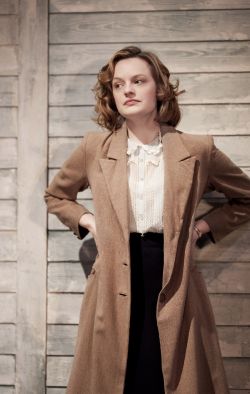Who needs America for the American theatre? Barely six weeks into this year, and already we've had the bracing and bilious Becky Shaw, the West End transfer of Bruce Norris's perpetually award-scooping Clybourne Park and Woody Guthrie taking up residence at the Arts Theatre courtesy of Woody Sez. What's been lacking has been the sort of defining revival on the order of last season's All My Sons that shakes down an extant text, inducing in sometimes unruly West End audiences a wondrous hush. Well, the wait is over: The Children's Hour has reached town anew in a production so powerful that for much of the evening, an utterly riveted house seemed to be holding its collective breath.
Of course they are, cynics might counter, arguing that punters are there merely to gawp at the return to the Comedy Theatre - seen at the same address this time last year in The Misanthrope - of Keira Knightley, playing well outside her comfort zone in a startling slow burn of a performance that pays off big time by the play's end. It's one thing, though, to pull in a public and quite another to keep them attentive, expectant, rapt. For that, credit not only a 1934 play that rings out with unexpected vigour as a riposte to righteousness in whatever form it may take but, particularly, to the scorching hold over the play exerted by the director, Ian Rickson, reminding us once again that this largely unsung talent (where are his Olivier Awards?) stands near the very top of the British directorial tree.
In lesser hands, I suppose Hellman's cannily structured play, with its nods to both Ibsen and Chekhov, could come across as mere melodrama, and there remain those who - wrongly in my view - deride its surpassingly bleak finish for retrograde sexual politics: the self-loathing homosexual and all that. The fact is, Hellman, in what was her debut play, does chart the tensions of same-sex desire (in this case from one 20something schoolmistress toward another) with unsparing emotional candour. But in place of anything approaching prurience, Rickson exposes much the same tensile strength to the writing that was mined by Howard Davies when he staged the same play for the National Theatre over 16 years ago. While not a single New York director has gone near The Children's Hour in my lifetime, two Britons in varying ways have shone a torch on the abiding, highly disturbing paradox underpinning a play about a toxic lie that succeeds in teasing out a ruinous truth.
One has to wonder, for instance, whether Arthur Miller didn't have The Children's Hour at least partly in mind when he wrote The Crucible, his 1953 classic beginning, as this play does, with collective hysteria amongst a community of child-women, in this case the giggly, emotionally febrile girls at a New England boarding school who are seen poring over the text of Antony and Cleopatra. But whereas Miller builds toward an actual courtroom scene, Hellman more cunningly puts all her characters to varying degrees on trial, most overtly after the interval when the play's principal male, a kind if tough-talking doctor (Tobias Menzies), acts as de facto judge and jury to the damaged young Mary (the preternaturally accomplished Bryony Hannah), the student whose whispers about her teachers precipitate a galloping poison that leaves no one unscathed. (In terms of Antony and Cleo, Mary is this play's resident asp.)
 Menzies's empathically portrayed Joe is in fact due to marry Knightley's Karen, who is finally beginning to make a success of the farmhouse-turned-school that she runs with decade-old college chum Martha (Mad Men's Elisabeth Moss, in the West End debut of any American's dreams). But it's the self-evidently disturbed Mary - Joe's cousin - who puts a grievous spanner in the works, setting herself at odds with Karen from the off in an altercation about flowers that is nothing compared to the psychic mayhem generated when she returns home to her grandmother, Amelia Tilford (the great Ellen Burstyn, pictured right with Hannah), eager never to revisit a school where she feels unwanted, not to mention in no way loved.
Menzies's empathically portrayed Joe is in fact due to marry Knightley's Karen, who is finally beginning to make a success of the farmhouse-turned-school that she runs with decade-old college chum Martha (Mad Men's Elisabeth Moss, in the West End debut of any American's dreams). But it's the self-evidently disturbed Mary - Joe's cousin - who puts a grievous spanner in the works, setting herself at odds with Karen from the off in an altercation about flowers that is nothing compared to the psychic mayhem generated when she returns home to her grandmother, Amelia Tilford (the great Ellen Burstyn, pictured right with Hannah), eager never to revisit a school where she feels unwanted, not to mention in no way loved.
Demanding protestations of affection from the commanding matriarch, Mrs Tilford, even as she coerces a pigtailed classmate, Rosalie (Amy Dawson), into doing her bidding and worse, Mary is the troubled pivot of a troubling play, her fainting spells leading to grandiose claims of heart pains that, in their way, are true. It's revealed that Mary's own father committed suicide, a fact with which her own grandmother has never come to grips. So is it any surprise that Mary's disturbances eventuate in further loss of life, a belated reckoning, and the realisation that Karen and Martha's hard-won school has become an emptied-out jail? Small wonder that the production's final image finds a shellshocked Karen gasping for air, rather like a seagull waiting to be set free. Chekhov's play, directed by Rickson to great acclaim on both sides of the Atlantic, provides an obvious narrative template for Hellman's own conclusion, and Mark Thompson's high-walled set, shimmeringly lit by Neil Austin, is alternately airy, elegant and suffocating, as required. (The scene changes are especially deftly handled.)
As was true with both Kristin Scott Thomas in The Seagull and Mark Rylance in the Broadway-bound Jerusalem, Rickson is able to make of a putative star vehicle a genuine company occasion, mixing established names with fresh-faced finds, starting here with the scarily committed Hannah. (Her body language at one point suggests a malignant rag doll come to life.) One of three visiting American performers, Carol Kane deepens from wide-eyed eccentric near the start, playing Martha's boozy aunt, to devolve by the finish into a panic-stricken accomplice to tragedy: a florid creature of the theatre so busy acting that she neglects to act. Burstyn, not far off 80 and looking magnificent, impresses mightily as a woman of rectitude - no gossip for her! - who nonetheless succumbs to the very chatter she has seemed eager to forestall. (Oscar devotees may enjoy seeing on the same stage 1974 Best Actress-winner Burstyn alongside 1975 nominee Kane.)
 But it's worth noting for all the chewing over the nature of their rapport that Karen and Martha only really get a prolonged scene together late on, well along the way to a tremulous finish that finds both actresses in blazing form. For much of the first half, I couldn't get beyond Knightley's petulant lower lip and her habit of sliding in and out of the (admittedly tricky) regional American accent. But there's no denying the vividness with which she communicates someone newly at odds with both love and language, recoiling from the very touch of her fiancé even as she starts to mistrust words. (The corruption of language, indeed, is one of Hellman's themes.) Their dialogue about "waiting" - Karen: "For what?"; Martha: "I don't know" - anticipates Beckett by a good two decades.
But it's worth noting for all the chewing over the nature of their rapport that Karen and Martha only really get a prolonged scene together late on, well along the way to a tremulous finish that finds both actresses in blazing form. For much of the first half, I couldn't get beyond Knightley's petulant lower lip and her habit of sliding in and out of the (admittedly tricky) regional American accent. But there's no denying the vividness with which she communicates someone newly at odds with both love and language, recoiling from the very touch of her fiancé even as she starts to mistrust words. (The corruption of language, indeed, is one of Hellman's themes.) Their dialogue about "waiting" - Karen: "For what?"; Martha: "I don't know" - anticipates Beckett by a good two decades.
The fierce-eyed Moss (pictured above), in turn, is unforgettable as a woman deemed "unnatural" by her aunt whose true nature comes pouring forth in an 11th-hour revelation that would never have occurred without the landmines earlier detonated by Mary's accusations. Snapping at the delivery man ("I've got eight fingers; I'm a freak") who briefly interrupts the women's gathering entrapment, the actress suggests emotional agitation giving way to actual violence, Martha's ruthlessness nowhere more apparent than when directed against herself. "We are bad people," she proclaims, the pair exiled from the town around them. They've learned to their cost the full recklessness of moral wrongdoing in a production poised, and absolutely rightly, to take the town.















Add comment